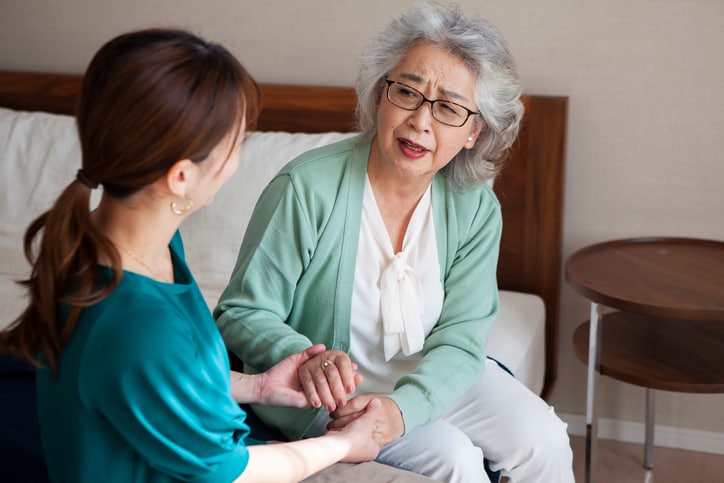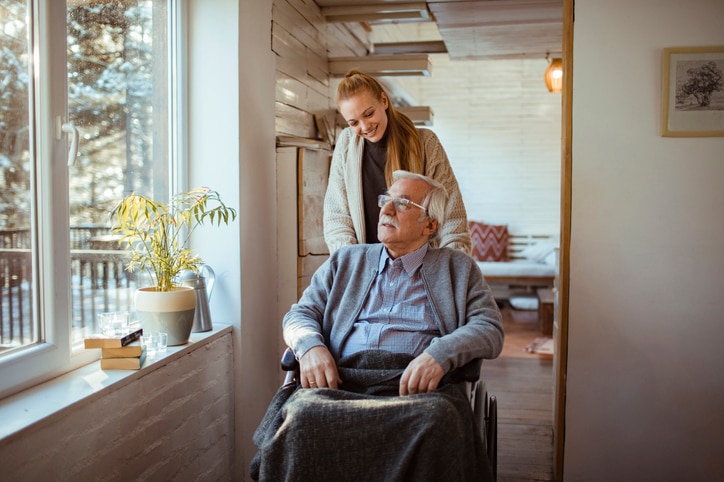In this article
You might find yourself struggling to know exactly when it is time for an older loved one to transition from aging in place into an assisted living facility. It’s a challenge Dr. James P. Richardson, chief of geriatric medicine ascension at St. Agnes Hospital Baltimore, Maryland, frequently sees families contend with. “Many times families will come to me unsure what to do about an elderly loved one’s living situation,” he notes. “They are looking for hard rules to determine whether an assisted living facility is the right answer.”
Nonetheless, Richardson points out that each situation is different. “Patients have differing needs and resources,” he says. “Determining if assisted living is the answer means evaluating various factors.”
Wondering, “when is it time for assisted living?” Here are the signs you need to take into consideration.
Health and medical issues
Changes in physical health, mental health and overall well-being are often the catalyst for a senior to move from independent living to assisted living. Some signs to look for, according to Ann Kriebel, a family and gerontological nurse practitioner and faculty member of Walden University:
- Early stages of Alzheimer’s or other dementia symptoms.
- Neglecting to shower or take a bath — or keeping clothes and appearance clean.
- Forgetting to take medications, taking the wrong amounts or taking too much.
- Vision changes, hearing issues.
- Losing weight or gaining weight.
- Increased difficulty walking or falling, especially if a home has a lot of stairs.
- No longer able to do household chores like dishes, cooking, or cleaning.
- Increasing isolation and signs of depression.
- Confusion about the time, date, month or year.
- General forgetfulness such as continually misplacing items.
Red flags to look for in your older loved one’s home
Living independently requires the ability to do many tasks around the house. If a senior can no longer take care of their house safely, this may be a reason to look for an assisted living facility. Signs to look for, according to Kriebel, include:
- Inability to prepare meals or shop for groceries.
- Not being safe around the stove.
- Unable to keep track of doctor’s appointments or other engagements.
- Inability to manage paying bills, rent or mortgage, pay taxes and other costs of living expenses.
- Inability to care for the home including minor housework, yard work and home repairs.
- Inability to drive safely to appointments or social engagements.
“Being cooped up in the house, unable to do the things they enjoy or even just socialize with other people, can cause anxiety and depression. The only way to remedy this is through engagement often granted by a communal living environment.”
— Laurie Gaines, business development specialist at LCB Senior Living
Social and mental issues to note
To live independently, seniors need to have a strong support system in place which may include family nearby, friends or ties to the community. If they do not have people who can help them to manage their daily activities, it may be better for them to move to an assisted living situation.
“As seniors grow older at home, their world begins to shrink in front of their eyes, and in addition to physical limitations come mental concerns as well,” says Laurie Gaines, business development specialist at LCB Senior Living. “Being cooped up in the house, unable to do the things they enjoy or even just socialize with other people, can cause anxiety and depression in seniors. The only way to remedy this is through engagement often granted by a communal living environment.”
Kriebel shares a few red flags along these lines:
- Increased dependence on you for daily tasks.
- Increased need for you to “cue” them to take medication, bathe or eat.
- Reluctance to socialize with peers or participate in activities or hobbies the senior once enjoyed.
- Loss of a support system — perhaps friends have moved away, they lack connection to their community, loved ones too far away and unable to come in a timely manner should there be an emergency supportive friends or loved ones nearby in case of an emergency.
- Complicated medical issues that require more assistance to manage and could benefit from more care.
You’ll also do well to pay attention to how your own mental well-being is affected by caring for an older loved one. If you’re unable to tackle your daily tasks (such as complete work, take care of your other family members) or are having health issues (such as burnout, anxiety or depression) because your older loved one needs more assistance than you can reasonably offer, it might be time to consider assisted living.
Why you should look out for subtle changes in behavior
When a senior lives independently, it is crucial to be on the lookout for subtle changes in their behavior, emphasizes Kriebel. A loved one exhibiting just a few of the issues above may not be in need of assisted living. But if they are experiencing several of the above factors, it may be time to consider whether aging in place is allowing them the ability to live their best life. Remember that it may not be one major incident — like a fall or minor car accident — that makes it clear they need to move to assisted living; instead, a series of small changes could make independent living difficult, dangerous or just less fulfilling.
Many times, families consider assisted living after an emergency, but it is better to make a move before anything dangerous occurs. “Having time to make informed decisions and time to look for a good, assisted living facility that meets the needs of a loved one is always best,” says Kriebel. “There is often a waiting list for acceptance into a facility. It is always best to talk when your loved ones are healthy and have a clear perception of what they want in a facility.”
“An assisted living facility should care not only for your loved one’s physical being but also their mental and spiritual well-being.”
— Ann Kriebel, family and gerontological nurse practitioner
How assisted living can improve your loved one’s quality of life
You and other well-meaning family members may not have the time or skill to care for a loved one. In an assisted living facility, residents can maintain independence while still having access to the professional care they need. There are activities, group meals and more opportunities to socialize.
“The idea of sending a loved one to a senior living residency can be incredibly guilt-inducing,” acknowledges Gaines. “However, it isn’t ‘end of life’ — it’s a new life.”
Remember, assisted living is not a nursing home environment. Seniors are allowed and often encouraged to be as independent as they can be safely (such as bathe on their own and handle their own medications). “It helps to explain to your loved one that assisted care professionals are only there to help them with their needs — they won’t take over,” notes Mitchell.
Ultimately, assisted living is not about giving up total independence, but about having assistance available when necessary to improve quality of life for both the senior and their caregivers. As Kriebel concludes, “An assisted living facility should care not only for your loved one’s physical being but also their mental and spiritual well-being.”






